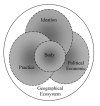Cultural determinants of help seeking: a model for research and practice
- PMID: 19999745
- PMCID: PMC2796597
- DOI: 10.1891/1541-6577.23.4.259
Cultural determinants of help seeking: a model for research and practice
Abstract
Increasing access to and use of health promotion strategies and health care services for diverse cultural groups is a national priority. While theories about the structural determinants of help seeking have received empirical testing, studies about cultural determinants have been primarily descriptive, making theoretical and empirical analysis difficult. This article synthesizes concepts and research by the author and others from diverse disciplines to develop the midrange theoretical model called the Cultural Determinants of Help Seeking (CDHS). The multidimensional construct of culture, which defines the iterative dimensions of ideology, political economy, practice, and the body, is outlined. The notion of cultural models of wellness and illness as cognitive guides for perception, emotion and behavior as well as the synthesized concept of idioms of wellness and distress are introduced. Next, the CDHS theory proposes that sign and symptom perception, the interpretation of their meaning, and the dynamics of the social distribution of resources are all shaped by cultural models. Then the CDHS model is applied to practice using research with Asians. Finally, implications for research and practice are discussed.
Keywords: Asian Immigrants; Cross Cultural Mental Health; Cultural Models; Help Seeking; Theoretical Models.
Figures
Similar articles
-
Defining and Theorizing About Culture: The Evolution of the Cultural Determinants of Help-Seeking, Revised.Nurs Res. 2018 Mar/Apr;67(2):161-168. doi: 10.1097/NNR.0000000000000264. Nurs Res. 2018. PMID: 29489636 Free PMC article.
-
Testing the influence of cultural determinants on help-seeking theory.Am J Orthopsychiatry. 2018;88(6):650-660. doi: 10.1037/ort0000353. Epub 2018 Sep 3. Am J Orthopsychiatry. 2018. PMID: 30179023 Free PMC article.
-
The integrated behavioral model of mental health help seeking (IBM-HS): A health services utilization theory of planned behavior for accessing care.J Couns Psychol. 2024 Oct;71(5):315-327. doi: 10.1037/cou0000754. Epub 2024 Aug 8. J Couns Psychol. 2024. PMID: 39115906
-
Health care seeking for HIV/AIDS among South Asians in the United States.Health Soc Work. 2004 May;29(2):106-15. doi: 10.1093/hsw/29.2.106. Health Soc Work. 2004. PMID: 15156843 Review.
-
Help-seeking among Asian and Pacific Americans: a multiperspective analysis.Soc Work. 1997 Mar;42(2):176-86. doi: 10.1093/sw/42.2.176. Soc Work. 1997. PMID: 9092082 Review.
Cited by
-
The Clinical Ethnographic Interview: a user-friendly guide to the cultural formulation of distress and help seeking.Transcult Psychiatry. 2012 Apr;49(2):302-22. doi: 10.1177/1363461511425877. Epub 2011 Dec 22. Transcult Psychiatry. 2012. PMID: 22194348 Free PMC article.
-
Cultural beliefs about breast cancer in Vietnamese women.BMC Womens Health. 2019 Jun 11;19(1):74. doi: 10.1186/s12905-019-0777-3. BMC Womens Health. 2019. PMID: 31185959 Free PMC article.
-
Potential Help-Seeking Behaviors Associated with Better Self-Rated Health among Rural Older Patients: A Cross-Sectional Study.Int J Environ Res Public Health. 2021 Aug 29;18(17):9116. doi: 10.3390/ijerph18179116. Int J Environ Res Public Health. 2021. PMID: 34501707 Free PMC article.
-
Community perception towards mental health problems in Ethiopia: a mixed-method narrative synthesis.BMC Psychiatry. 2024 Aug 30;24(1):588. doi: 10.1186/s12888-024-06047-w. BMC Psychiatry. 2024. PMID: 39215248 Free PMC article.
-
Palestinian Muslim College Students' Attitudes to Mental Health Treatment: A Comparative Study.Int J Environ Res Public Health. 2022 Nov 30;19(23):16005. doi: 10.3390/ijerph192316005. Int J Environ Res Public Health. 2022. PMID: 36498076 Free PMC article.
References
-
- Alem A, Jacobsson L, Araya M, Kebede D, Kullgren G. How are mental disorders seen and where is help sought in a rural Ethiopian community?: A key informant study in Butajira, Ethiopia. Acta Psychiatrica Scandinavica Supplementum. 1999;100 397:40–47. - PubMed
-
- Antonucci TC. Social supports and social relationships. In: Binstock RH, George LK, editors. Handbook of aging and the social sciences. New York: Academic Press; 1990. pp. 205–226.
-
- Association of Asian Pacific Community Health Organizations. Taking action: Improving access to health care for Asians and Pacific Islanders. Oakland, CA: Author; 1995.
-
- Atkinson DR, Gim RH. Asian-American cultural identity and attitudes toward mental health services. Journal of Counseling Psychology. 1989;36(2):209–212.
-
- Backnik J. Introduction: Uchi/Soto: Challenging our concept of self, social order and language. In: Backnik JM, Quinn C, editors. Situated Meanings: Inside and outside in Japan: Self, society and language. Princeton: Princeton University Press; 1994.
Publication types
MeSH terms
Grants and funding
LinkOut - more resources
Full Text Sources


